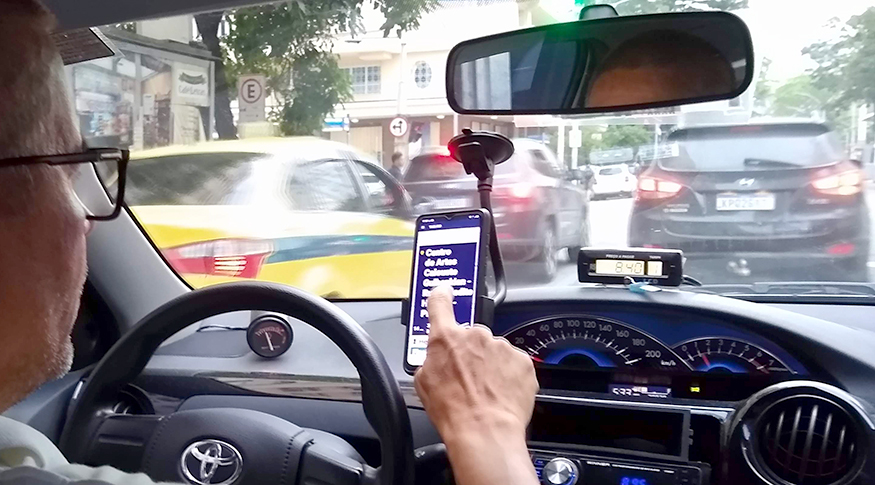The G20 and the Regulation of Platform Work by Apps
Faced with the impacts of technological transformations and the rapid rise of Artificial Intelligence in the labor market, the G20 is a fundamental space for applying ethical principles of transparency and guaranteeing labor rights, argues researcher Atahualpa Blanchet, in an exclusive article for the G20 Brasil website.
by Atahualpa Blanchet*
Work through digital platforms has become a reality in many parts of the world in recent years, transforming the lives of thousands of people who use apps and the services they provide.
The social and economic impacts of digital platform work have challenged the application of the parameters of current labor legislation, requiring strategic players to take a stand on the need to build and apply regulations that take into account the scope and complexity of the phenomenon. In a context of profound transformations, marked by the digitalization and relocation of labor relations, the G20 and its Labor and Employment Group are fundamental spaces for building consensus aimed at reducing inequalities, guaranteeing rights and promoting social justice.
It's important to note that the work model based on digital platforms is not limited to sectors such as transportation and deliveries. The modality is rapidly expanding into areas such as software programming, creative services and education, for example, pointing to the trend towards platformization of work in other activities.
Remote work platforms, known as "cloudwork", open up the possibility of working in a variety of fields using mobile devices from anywhere with an internet connection, creating a new generation of workers (such as digital nomads) whose common denominator is algorithmic subordination.
Artificial Intelligence management systems will therefore come to define elements of labor relations and production processes such as the distribution of tasks, monitoring, performance evaluation and decision-making, including on individual or collective promotions or dismissals.
Platform work in the G20
In the G20 countries, there are different regulatory approaches to digital platform work. Court rulings and the adoption of legislation aimed at the categories of drivers and couriers have been the main paths adopted so far. Even so, it is possible to identify certain advances in the recognition of ethical principles such as transparency, explainability and non-discrimination in the application of algorithmic management systems.
In March 2024, the European Union approved its first standard on the use of Artificial Intelligence management systems in the workplace. Consolidating aspects present in the regulations of countries in the bloc, the measure establishes the presumption of an employment relationship based on indicators of control and direction, taking into account collective agreements and the case law of the bloc's Court of Justice. The rule prevents dismissals based on automated decisions and obliges platforms to inform workers about how the algorithms work and the programming criteria.

In March 2024, the European Union approved its first standard on the use of Artificial Intelligence management systems in the workplace. Consolidating aspects present in the regulations of countries in the bloc, the measure establishes the presumption of an employment relationship based on indicators of control and direction, taking into account collective agreements and the case law of the bloc's Court of Justice. The rule prevents dismissals based on automated decisions and obliges platforms to inform workers about how the algorithms work and the programming criteria.
In the same month, the Brazilian government presented a bill to regulate the activities of app drivers. The proposal, the result of negotiations between representatives of workers and app companies, creates a new category of self-employed workers, guaranteeing them a set of social rights. The bill will go through parliament and is in line with the position of the Mercosur Labor Ministers, who in October 2023 approved a Declaration recognizing the rights of workers on digital app platforms.
In the UK, the Supreme Court ruled that app drivers are considered workers in an intermediate category between employee and self-employed. This decision guaranteed drivers’ rights such as minimum wage, vacation and retirement. The analysis of the degree of control exercised by companies over workers was fundamental in reaching this understanding.
In the United States, Washington state legislation on passenger transportation establishes that platform workers are not considered employees if the platform does not impose rules on working hours, cannot fire a worker for refusing to provide a service and does not prohibit an employee from linking up with other platforms.
In South Korea, mandatory coverage for unemployment and maternity insurance was extended in 2022 to delivery workers and drivers working on platforms and, in 2023, accident insurance with contributions split between workers and companies.
In India, the Social Security Code, approved in 2020, regulates the coverage of rights for platform workers and provides for insurance in the event of accident, death, disability or retirement, as well as health and maternity benefits financed by workers' contributions and a levy on platform turnover.
Algorithmic Transparency and its recognition by the G20
The effectiveness of regulations on platform work depends on G20 countries recognizing principles such as algorithmic transparency, explainability and non-discrimination, as well as workers' right to collective bargaining. In this scenario, the role of trade unions and academia in identifying the key elements of algorithmic management systems that affect workers is crucial.
It is in the face of this historic moment that the G20 Labor and Employment Group is called upon to build and establish a position on the application of the ethical principles of Responsible Artificial Intelligence, taking into account the precedent of European regulation, the laws, court decisions and legislative proposals of the G20 countries and the fact that the International Labor Organization (ILO) will begin the normative debate on platform work at its 2025 International Conference.
Atahualpa Blanchet is researcher at the Institute for Advanced Studies at the University of São Paulo (IEA-USP) and the Digital Transformation and Society Research Group at the Pontifical Catholic University of São Paulo (PUC-SP).